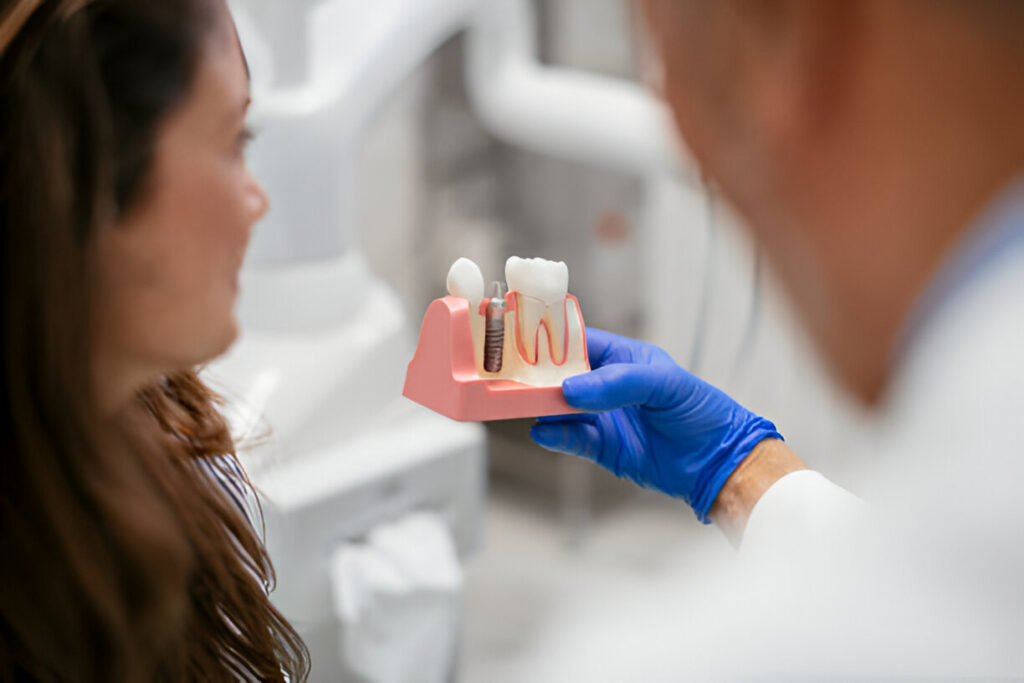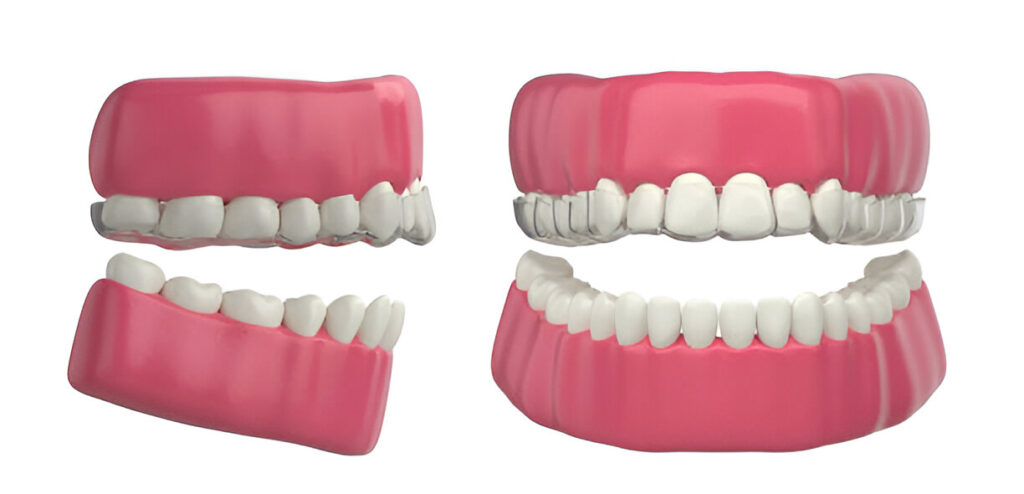Eating is an important part of life. When you lose teeth, it can affect how you eat and enjoy food. Dentures and dental implants are two popular solutions for missing teeth. But which is better for eating? Let’s explore both options and find out which one makes eating easier.
What Are Dentures and Implants?
Dentures are removable replacements for missing teeth. They rest on your gums and are held in place with adhesive or suction. Dentures can replace some or all of your teeth.
Dental implants are a permanent solution. A titanium screw is placed into your jawbone, acting like a tooth root. A crown is then fixed on top to look and feel like a natural tooth.
Can You Be Put to Sleep for Dental Implants in the UK?
Eating with Dentures vs. Implants
Chewing Power
Dentures sit on the gums and have limited chewing power. They can only manage about 50 pounds per square inch of bite force. This makes it hard to chew tough foods like steak, nuts, or raw vegetables. Dentures may also slip, causing discomfort while eating.
Implants are anchored securely into the jawbone. They restore bite force to nearly 200 pounds per square inch, similar to natural teeth. This means you can chew hard or sticky foods with ease.
Stability and Comfort
Dentures can move or slip, especially when eating or speaking. This can lead to gum irritation and difficulty biting into certain foods. Over time, bone loss in the jaw may cause dentures to become loose, requiring adjustments or replacements.
Implants stay firmly in place because they fuse with the jawbone. This stability ensures comfort while eating, with no risk of movement. Implants also help prevent bone loss, maintaining the shape of your face.
How Long Do Dental Implants Last?
Taste and Sensation
Dentures often cover the roof of the mouth, which can reduce taste sensation. The material may also interfere with the natural feeling of chewing.
Implants do not cover the palate, so they preserve your ability to taste and feel food. This makes eating more enjoyable.
Which Foods Are Easier with Each Option?
Dentures
Dentures are suitable for soft foods like mashed potatoes, soup, or pasta. Chewing harder foods can be challenging, and sticky foods like caramel may pull the dentures out of place.
Implants
With implants, you can eat a wide variety of foods, including crunchy, chewy, or hard items. Biting into an apple, enjoying a crisp carrot, or eating a juicy steak becomes effortless.
Maintenance and Care for Eating
Dentures
Dentures require more care to stay functional. You need to remove and clean them daily. Soaking them overnight in a cleaning solution helps maintain their quality. Denture adhesives may also need to be reapplied after meals.
Implants
Implants are cared for like natural teeth. Brushing twice a day and flossing are enough to keep them clean. Regular dental check-ups are also important to ensure the implant remains healthy.
How Long Do They Last?
Dentures
Dentures usually last 5 to 8 years. Over time, your jawbone changes shape, which can make them loose. This might require adjustments or replacements.
Implants
Implants can last a lifetime with proper care. The crown on top may need replacement after 15 to 20 years, but the implant itself is designed to be permanent.
Can You Get a Dental Implant Years After Extraction?
Cost Considerations
Dentures are generally less expensive upfront. However, they need regular replacements and adjustments, which can add to the cost over time.
Implants are more expensive initially but are a one-time investment. Their durability and minimal maintenance make them cost-effective in the long run.
Suitability for Eating
Dentures are a good option if you prefer a non-surgical, lower-cost solution. However, they may not provide the comfort and efficiency needed for eating certain foods.
Implants are ideal if you want a permanent solution with better chewing ability and comfort. They work well for people who have enough jawbone to support the implant.
Making the Right Choice
Choosing between dentures and implants depends on your priorities. If eating comfort, stability, and long-term benefits are important, implants are the better option. If you prefer a quick, non-surgical solution, dentures can still help you eat and smile with confidence.
Final Thoughts
Eating with dentures or implants is different. Implants offer a more natural and stable experience, making it easier to eat most foods. Dentures are a more affordable and quicker option but may come with limitations. Talk to your dentist to decide which solution works best for your lifestyle. Enjoying your favourite foods is essential for a happy and healthy life.
Contact us today!
Take the First Step with Cove Dental and Implant Centre
At Cove Dental and Implant Centre, we understand how important it is to enjoy your meals without discomfort or limitations. Whether you’re considering dentures or implants, our expert dentist in Aberdeen is here to guide you through the process and help you make the best decision for your needs.
With personalised care, advanced dental technology, and a commitment to improving your quality of life, we ensure you leave with a confident smile and the ability to enjoy your favourite foods again. Contact us today to book a consultation and take the first step towards better eating and a healthier smile!
Frequently Asked Questions
Do dentures affect your ability to taste food?
Yes, dentures may cover the roof of your mouth, which can reduce taste sensation. Implants do not cover the palate, preserving your ability to taste food fully.
How long do dental implants last compared to dentures?
Implants can last a lifetime with proper care, while dentures typically need replacement every 5–8 years due to changes in the jawbone structure.
Can dentures slip while eating?
Yes, dentures can slip or move when eating, causing discomfort or insecurity. Implants, being securely anchored to the jawbone, eliminate this issue entirely.
Are dental implants harder to maintain than dentures?
No, implants are maintained like natural teeth with regular brushing and flossing. Dentures require daily removal, cleaning, and overnight soaking, making them more time-intensive.
Can I eat all types of food with dental implants?
Yes, dental implants restore natural bite force, allowing you to enjoy hard, crunchy, or sticky foods comfortably, including apples, nuts, and steak.





